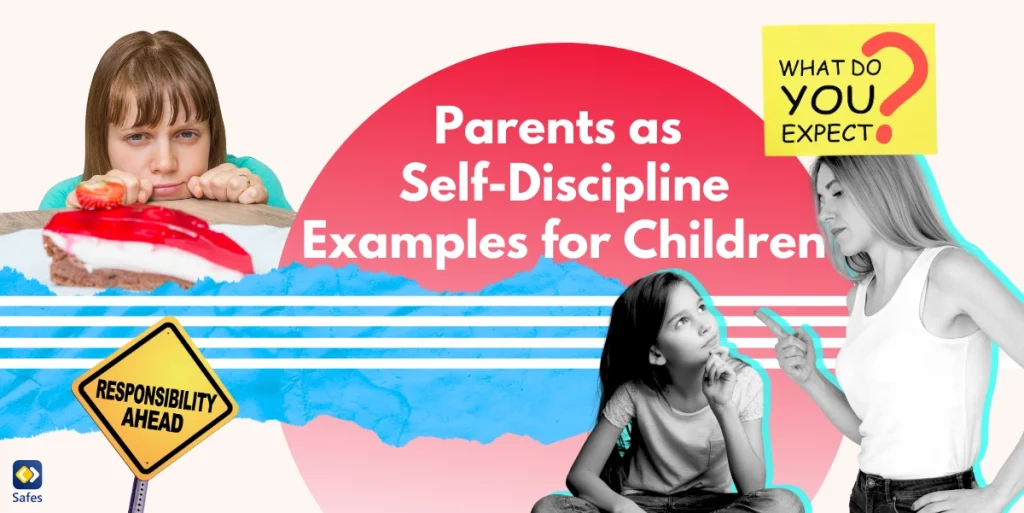Self-discipline is the foundation for achieving long-term goals and maintaining a balanced life. When we practice self-discipline, we build the ability to control our actions and make positive choices. This skill is crucial for adults and even more vital for children, as it sets the stage for their future success.
Download and Start Your Free Trial of the Safes Parental Control App
Children who develop self-discipline tend to perform better academically, socially, and emotionally. This essential trait helps them manage their time effectively, resist impulsive behaviors, and face challenges with resilience. Teaching kids to cultivate self-discipline isn’t merely about controlling their behavior; it’s about empowering them to make thoughtful decisions throughout their lives.
This guide will explore how parents can be self-discipline examples and impart discipline skills to their children. By providing practical examples and strategies, we’ll show you how to nurture this critical trait in your child’s development, ensuring they grow up to be responsible and self-reliant individuals.
What Is Self-Discipline?
Self-discipline is the ability to control your actions and reactions, even when it’s tough. It’s about making decisions that align with your long-term goals, despite temptations or distractions. Imagine wanting a snack but choosing a healthier option because you’re committed to a fitness goal. That’s self-discipline in action!
There are different types of discipline: self-discipline and external discipline. While external discipline involves rules and consequences set by others, self-discipline requires personal commitment and internal motivation. It’s like the difference between a teacher enforcing study times and a student choosing to study because they value learning.
For instance, instead of binge-watching a show, one can allocate time for reading or working on a hobby. These everyday choices highlight how self-discipline shapes our habits and helps us achieve what we truly want in life.
Why Do Our Children Need Self-Discipline?
Self-discipline for kids is crucial for their development. It helps with their self-regulation, allowing them to manage their emotions and behaviors effectively. When children practice self-discipline, they tend to perform better academically. They can focus on their studies and complete their assignments without constant reminders.
Beyond academics, self-discipline improves social skills. Children who are self-disciplined can communicate better and maintain healthier relationships. They understand the importance of waiting their turn, listening to others, and resolving conflicts peacefully. This foundation of self-regulation is essential for emotional regulation, helping kids navigate their feelings in constructive ways.
Looking at the bigger picture, self-discipline sets children up for success in personal and professional life. Studies show that successful people often attribute their achievements to self-discipline. By learning to set and pursue long-term goals from a young age, children can build a future where they thrive in various aspects of life.
One study by the Canadian Paediatric Society highlights the significant role of consistent routines and active parental involvement in fostering self-discipline in children. It emphasizes that structured environments, clear expectations, and consistent consequences are crucial for developing self-discipline, leading to better academic performance, improved social skills, and emotional regulation.

What Does Lack of Self-Discipline Bring?
A lack of self-discipline can lead to the development of bad habits. Children might struggle with procrastination. This makes it hard for them to complete tasks on time. These habits can create a snowball effect, causing stress and anxiety as deadlines approach, leading to mental health challenges.
Without self-discipline, children might face poor academic performance. They may find it difficult to concentrate in class or prioritize their studies. Behavioral issues can also arise, such as acting out or refusing to follow rules. Additionally, they may struggle with social interactions, finding it hard to form and maintain friendships due to impulsive behavior.
What Are the Signs of Self-Disciplined Character?
Recognizing self-discipline in children can help parents nurture and encourage these traits. Here are some key characteristics of a self-disciplined individual:
- Resists Temptations: A self-disciplined child can resist temptations, such as choosing to finish their homework before playing video games. This ability to stay focused on the task at hand is essential for success.
- Delayed Gratification: They understand the concept of delayed gratification. For example, they might save their allowance to buy something special later rather than spending it immediately. This skill helps them achieve long-term goals and teaches financial responsibility.
- Perseverance: Self-disciplined children show perseverance by sticking with challenging tasks until they are completed. Whether it’s mastering a difficult piano piece or solving a tough math problem, they don’t give up easily.
- Responsibility: They take responsibility for their actions and understand the consequences. For instance, if they forget their homework, they acknowledge their mistake and plan better next time.
- Time Management: A self-disciplined child manages their time well, balancing schoolwork, extracurricular activities, and leisure. They might use a planner or set reminders to stay organized.
These traits not only contribute to immediate success but also lay a strong foundation for their future endeavors.
Top 5 Strategies to Improve Self-Discipline in Children
Improving self-discipline in children is a vital part of their development. Here are five effective strategies parents can use to help their kids cultivate this essential skill:
Modeling Behavior
Children learn by watching their parents. If you step out of your comfort zone to stick to a routine or complete a challenging task, your children are likely to follow. For instance, if they see you reading books for self-discipline, they will understand its importance.

Setting Clear Expectations
Clear rules and expectations are crucial for children. When setting goals, make sure they are specific and understandable. For example, instead of saying “do your homework,” say “spend 30 minutes on math and 30 minutes on reading each day.”
Consistent Consequences
Consistency is key when it comes to enforcing rules. Children need to know that there are consequences for their actions. If screen time is limited to 30 minutes per day, make sure this rule is always enforced, whether it’s a school night or a weekend.
Encouraging Positive Habits
Encouraging healthy habits is another way to build self-discipline. Establishing regular study times, setting chores, and maintaining a bedtime routine can help children develop discipline. These routines teach them the importance of staying focused and organized.
Teaching Problem-Solving Skills
Teaching children how to solve problems is crucial for developing self-discipline. Engage them in age-appropriate problem-solving activities, like puzzles or planning a small project. This helps them learn to stay focused on tasks and find solutions independently.
How Can Safes Help?
Parental control apps are powerful tools that help parents manage their children’s online activities beyond what Windows parental controls may offer. One of such apps, Safes, supports parents by allowing them to monitor and guide their children’s online activities. This monitoring helps achieve your goals of ensuring safe internet use and encouraging responsible behavior. With features like web filtering and location tracking, parents can keep an eye on what their children are doing online and where they are.
The features of Safes include setting screen time limits, blocking inappropriate websites, and generating detailed activity reports. These tools are essential for instilling self-discipline as they encourage children to use their devices responsibly. For instance, limiting screen time helps children learn the importance of balancing online activities with other aspects of life, such as homework and physical exercise.
You can start your free trial of Safes on iOS and Android today!
Conclusion
Self-discipline is vital for a child’s development, impacting their academic performance, social skills, and emotional regulation. We discussed how self-discipline differs from external discipline and provided strategies for fostering it, such as modeling behavior and setting clear expectations.
Emphasizing self-discipline in children helps them achieve long-term goals and sets them up for success. Teaching perseverance for kids and helping them develop healthy habits are crucial steps. Remember, successful people often credit their self-discipline as a key factor in their achievements.
Parents can use tools like Safes to support their efforts. By implementing screen time limits and monitoring online activities, these apps help parents achieve their goals of nurturing disciplined, responsible children. Encouraging self-discipline now can lead to a brighter, more successful future for your children.
Your Child’s Online Safety Starts Here
Every parent today needs a solution to manage screen time and keep their child safe online.
Without the right tools, digital risks and excessive screen time can impact children's well-being. Safes helps parents set healthy boundaries, monitor activity, and protect kids from online dangers—all with an easy-to-use app.
Take control of your child’s digital world. Learn more about Safes or download the app to start your free trial today!




